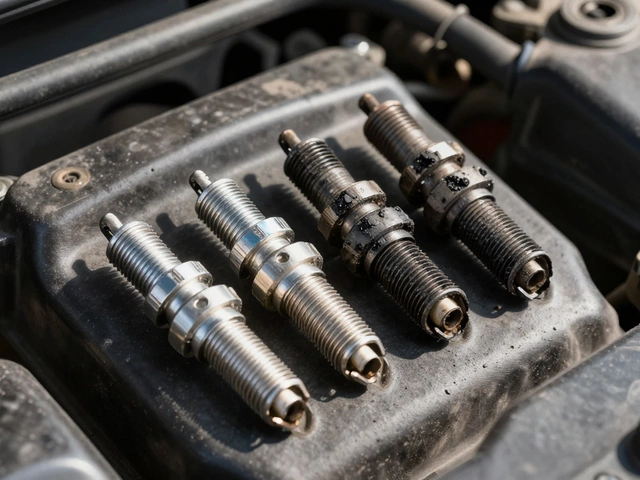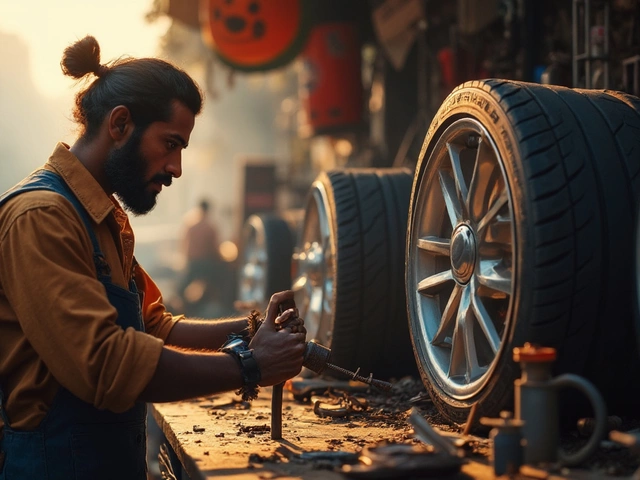So, you're curious about alloy wheels—those shiny, sleek circles that seem to elevate any car's look. Let's break it down. Alloy wheels are made from a mix of metals, usually aluminum or magnesium. This blend results in a wheel that's not only lighter than traditional steel wheels but also stronger and more capable of handling that fast-paced lifestyle you might love.
But why do people rave about these wheels? Well, aside from the aesthetic upgrade they offer, alloy wheels improve your car's performance. Being lighter means less weight for your engine to pull, which can mean slightly better fuel economy—nice bonus, right? Plus, they usually dissipate heat better, which is a plus for your brakes during those long road trips.
If you've got a passion for cars or even a casual interest, knowing your way around alloy wheels is a smart move. It's not just about looks; it's also about functionality and care. Stick around to learn more about keeping these wheels in top-notch condition and making the best choice for your vehicle.
- What Are Alloy Wheels?
- Advantages of Alloy Wheels
- Caring for Your Alloy Wheels
- Choosing the Right Alloy Wheels
What Are Alloy Wheels?
Alloy wheels are a big deal in the automotive world, blending metals like aluminum and magnesium to create something truly special. What's the big deal about these wheels? Well, let’s kick things off by saying that they're a step up from the standard steel wheels—you know, those heavier and simpler counterparts.
Most alloy wheels are produced using casting or forging processes. Casting involves pouring molten metal into a mold to form the wheel, while forging is a more intense process where the wheel is formed with pressure, making it denser and stronger. Thanks to these processes, alloy wheels typically have a beautiful design and a lighter weight, which isn't something you'll get much with traditional wheels.
Why It Matters
So, why should you care about all this metal mumbo jumbo? Interestingly, the lightness of these car wheels really counts. They can seriously affect your vehicle’s performance. With less weight, your car doesn't have to work as hard to move, and that can make your drives a bit smoother and even improve your fuel economy. Sounds good, right?
Did you know that up to 70% of vehicles come with alloy wheels as standard? These wheels also have better heat dissipation, which can protect your brakes from overheating. This is especially handy if you're into spirited drives or find yourself in stop-and-go traffic all the time.
Benefits at a Glance
- Lighter than steel, enhancing performance
- Great heat dissipation helps your brakes
- Visually appealing with a variety of designs
All in all, understanding what alloy wheels are all about helps you make informed choices. Whether you’re looking to boost your vehicle’s performance or just want something that makes your ride look a bit cooler, knowing the ins and outs of these wheel materials can really steer you in the right direction.
Advantages of Alloy Wheels
Alloy wheels are a popular choice for many car enthusiasts, and there's good reason for that. One of the biggest perks is their weight advantage. Being lighter than the traditional steel wheels reduces the overall weight of the vehicle. This not only helps improve fuel efficiency but also enhances the car's acceleration and braking performance.
Style and Customization
Let's be honest—looks matter. Alloy wheels come in a wide variety of designs and finishes. This means you can easily find a set that complements your vehicle's style. Whether you want a sleek, modern aesthetic or something a bit more classic, there's an alloy wheel design out there for you.
Improved Performance
Thanks to their lighter weight, alloy wheels allow for better heat dissipation from your cars' brakes. This is especially beneficial during long drives where the brakes tend to heat up. Less heat means less risk of brake failure, which is always a good thing.
- Reduced Unsprung Weight: This directly results in better handling and a smoother ride.
- Rust Resistance: Alloys generally resist corrosion better than traditional steel.
Resale Value
Cars with alloy wheels can have a slightly higher resale value. Many buyers see them as a desirable feature, thus adding a bit more to the vehicle's worth when it's time to sell.
Environmental Impact
Did you know that the production of alloy wheels is less resource-intensive compared to steel wheels? In some cases, they're made from recycled materials, which is a step towards being kinder to our planet.
| Feature | Alloy Wheels | Steel Wheels |
|---|---|---|
| Weight | Lighter | Heavier |
| Heat Dissipation | Better | Poorer |
| Style Options | Varied | Limited |
So, if you're on the fence about upgrading to alloy wheels, the benefits extend beyond just aesthetics. They offer a blend of practicality and flair that can elevate both your ride and your driving experience.

Caring for Your Alloy Wheels
So, you've splurged on those awesome alloy wheels, and they look fantastic. Now, you want to make sure they stay that way, right? Caring for them isn't rocket science, but it does require some regular attention. Let's dive into how you can keep them in tip-top shape.
Regular Cleaning
First things first, cleaning. Alloy wheels need frequent cleaning because brake dust can build up and make them look dull. Here’s an easy routine:
- Use a mild soap or a wheel cleaner specifically designed for alloy wheels. This ensures you're gentle on the finish.
- Grab a soft sponge or a brush with soft bristles to avoid scratches.
- Rinse thoroughly with water, making sure to get rid of all the soap and cleaner.
- Dry with a soft cloth to avoid water spots.
How often should you clean them? A good rule of thumb is once every two weeks, but if you’re driving in rough, dusty conditions, you might do it more often.
Preventing Corrosion
Choosing the right cleaner is crucial because harsh chemicals can eat away at the protective layer on your wheels, leading to corrosion. Go for pH-balanced cleaners.
| Product | pH Scale |
|---|---|
| Soap A | 7.5 (Neutral) |
| Soap B | 5.3 (Mildly Acidic) |
This table showcases popular wheel cleaners and their pH levels. Remember, the closer to neutral, the safer for your alloys.
Tire Pressure Matters
Your alloy wheels are only as good as the tires they support. Maintain proper tire pressure to ensure even wear and avoid unnecessary strain on your wheels.
Addressing Scratches and Damage
Got a scrape or a nick? Small damages can lead to bigger problems if ignored. Here’s how you can tackle them:
- Use a wheel repair kit for light scrapes. They usually come with everything you need, like sandpaper and matching paint.
- If the damage is severe, it might be time to consult a professional to avoid wheel imbalance.
Cruising around Auckland, you'll want your alloy wheels to look just as pristine as the day you got them! With these tips, you'll not only maintain that look but also protect your investment in the long run.
Choosing the Right Alloy Wheels
Picking the perfect alloy wheels can feel a bit daunting, but no worries. Whether you're in it for the look, performance, or both, the right wheels make a big difference. Here’s a straightforward guide to get you rolling in style and confidence.
Consider Your Car's Specifications
Start with your car’s specifications. Every vehicle has certain limits on wheel size and compatibility. Check your car manual or consult with a pro to ensure the wheels you fancy won’t mess with your car's balance or safety features.
Size Matters
Car wheels come in various sizes, and each size impacts how your car performs. Bigger wheels might look cool, but they could affect your fuel efficiency and ride quality. When choosing, aim for a size that complements your vehicle's design and offers a comfortable ride.
Check the Offset
Offset is the distance between the hub mounting surface and the wheel's centerline. It determines how the wheels fit within the wheel wells. A wrong offset can lead to poor handling or cause your tires to rub against the car body. Double-check the offset before making your final choice.
Material and Finish
While aluminum alloy is the most popular choice for its lightness and strength, the finish can vary. Choices include polished, painted, or even chrome. Think about where you drive most; polished wheels might demand extra care in rough terrains.
Order of Safety and Aesthetics
Flashy wheels are great, but safety comes first. Make sure your chosen wheels have been properly tested for durability and safety standards. You want something that lasts and protects while giving your ride a new flair.
Budget-Friendly Choices
Alloy wheels don’t have to burn a hole in your wallet. There are plenty of options out there that fit various budgets. Keep an eye out for deals, but don’t compromise on quality—cheap doesn’t always mean better.
Performance vs. Looks
If you’re a speed enthusiast, then performance might be your top priority. Performance wheels are typically lighter, aiding in enhanced handling. On the other hand, if cruising with style is your game, opt for designs that stand out without getting too wild.
In sum, selecting the right alloy wheels isn’t just about picking what looks good. Think about how you drive, budget constraints, and how you’ll maintain them. With the right choice, you can nail that sweet balance between form and function.






Write a comment